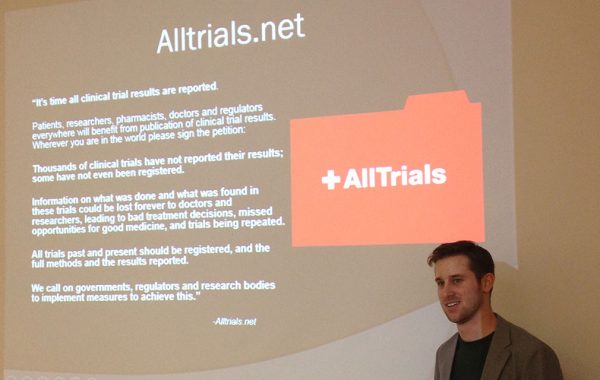Brian Chernak ’14
When researching drugs to prescribe, medical professionals may be unknowingly influenced by selective publishing of clinical trial data — which makes some drugs appear more effective than they actually are.
It’s a problem medical student Brian Chernak ’14 wanted to take on, so he began exploring how he could support better reporting of clinical trials. Now, thanks to a resolution Chernak authored, the American Medical Association (AMA) — the largest association of physicians and medical students in the country — is bringing more attention to the issue.
Chernak, a molecular biology major at Colgate who is now in his third year at SUNY Downstate Medical Center, was motivated by a conversation he had with another alumnus last January. That person (who asked to be anonymous) worked on a study at a large research institution involving a drug already on the market. Although the study showed that the drug did not work as well as others, he told Chernak the company did not want the findings published.
“That got me thinking, wow, that’s not OK,” Chernak said. He began researching the issue to see if anyone else was talking about it, and found the AllTrials campaign.
Chernak learned that many clinical trials are not made available to the public. “All these trials to determine whether or not drugs, protocols, and procedures [are effective] aren’t ever published,” he said. This makes it difficult for medical professionals to effectively research and prescribe treatments, he noted.
The Food and Drug Administration Amendments Act of 2007 (FDAAA) requires that many types of clinical trials be registered at ClinicalTrials.gov before a study is conducted, with results published within a year after the trial’s completion. “Evidence shows that the vast majority of clinical trials conducted in the United States still aren’t published at this website within one year, and about half of them are never published,” Chernak said.
In addition, medical journals’ editorial preferences tend to favor trials demonstrating positive or unique outcomes as opposed to negative or repetitive ones, Chernak explained. The New England Journal of Medicine, in 2008, ran a study that examined selective medical journal publishing of antidepressant trials from 1987 to 2004. Of the 74 trials during that period, 38 were positive and 36 were negative. Medical journals published 37 of the 38 positive trials, but only three of the negative studies.
“If you’re a researcher, [you’d find overwhelmingly positive data] making it appear these antidepressants worked much better and much more definitively than what actually was the case,” Chernak said.
Having been involved with the AMA medical student section (AMA-MSS) at Downstate, he got the idea to write a resolution there. “People always said, ‘If you find something you think needs to be changed, write a resolution; you can go to the AMA meeting and get medical students to support a policy change.’”
Chernak worked on the resolution calling for the AMA to support improved enforcement of the FDAAA regarding registration and reporting of trials. It also called for the AMA to sign the AllTrials petition supporting the registration of all past, present, and future clinical trials and the release of their summary reports.
At its meeting, the AMA approved the parts of his resolution concerning support for stronger enforcement of FDAAA deadlines, and support for the timely dissemination of clinical trial outcomes for public accessibility. AMA President Steven J. Stack said, “The AMA strongly supports improving the timeliness and accessibility of clinical trial data to reduce the duplication of research and help inform future research — ultimately improving health outcomes for patients. The AMA is pleased to join the AllTrials initiative to continue efforts aimed at ensuring open access to clinical trial data for physicians, researchers, and patients.”
Going forward, Chernak has been named as the medical student ambassador for the AllTrials USA campaign. He has also been giving speeches to medical students, telling them “that we take everything we learn in a textbook for granted, especially on drugs … and it’s important for us to [remember] that it’s not set in stone, and we should do research on the drugs we are prescribing.”
— Phil Gusman







